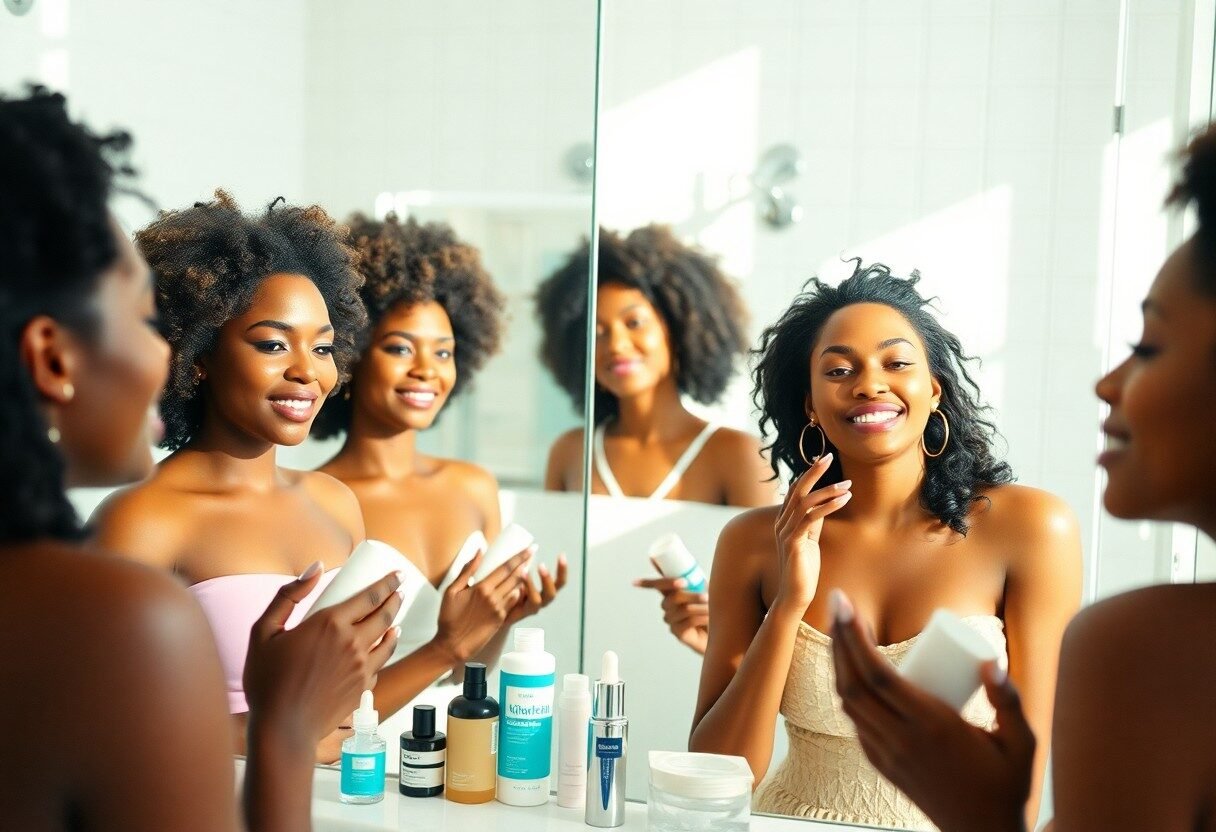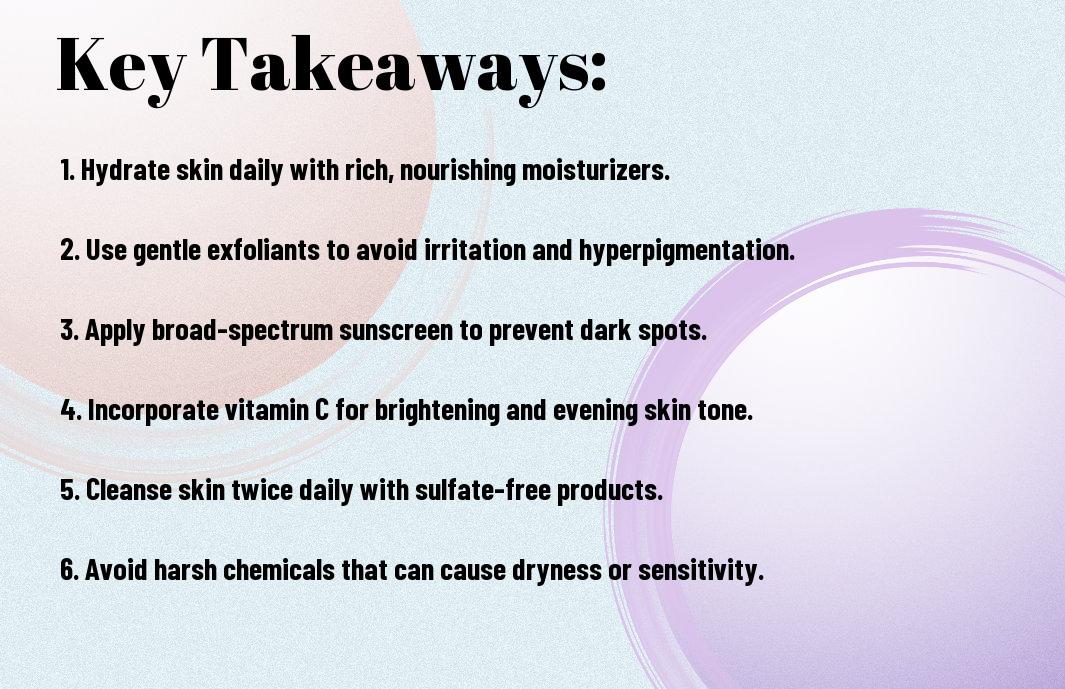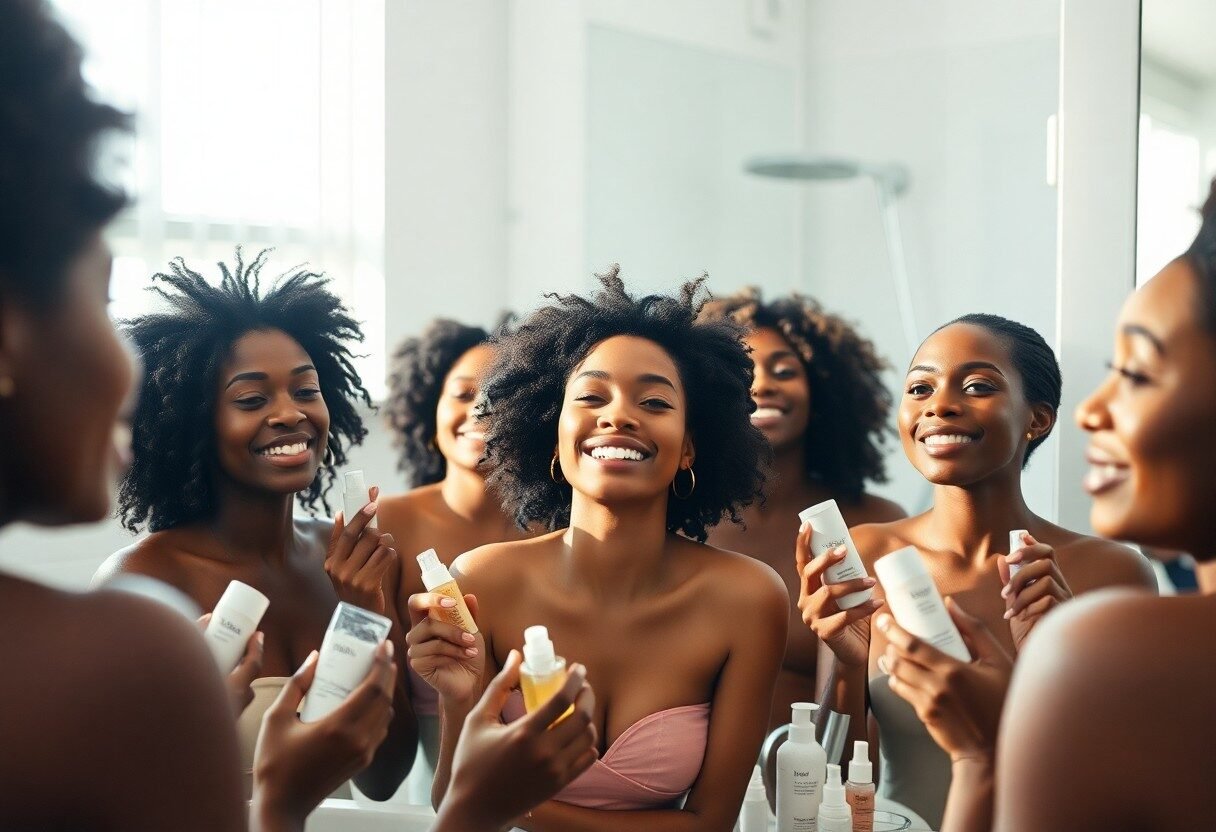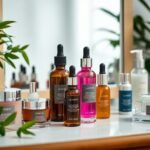
Skincare is not just a routine; it’s a vital practice that enhances your natural beauty and maintains healthy skin. As a Black woman, you may encounter unique challenges like hyperpigmentation and dryness, making it necessary to tailor your regimen accordingly. I will guide you through an effective approach that includes cleansing, moisturizing, and sun protection to help you achieve radiant skin while addressing specific needs. Let’s explore how to nourish your skin for a glowing and healthy complexion.
Key Takeaways:
- Identify your skin type (oily, dry, combination, or sensitive) to select appropriate products.
- Incorporate a gentle cleanser to remove impurities without stripping natural oils.
- Utilize a moisturizer that provides hydration and addresses specific skin concerns, such as hyperpigmentation.
- Sunscreen is imperative; use a broad-spectrum SPF 30 or higher daily to protect against UV damage.
- Consider incorporating serums with ingredients like vitamin C and hyaluronic acid for added benefits.
- Exfoliate regularly (1-2 times a week) with products suitable for your skin type to promote cell turnover.
- Consult with a dermatologist for personalized recommendations and to address any persistent skin issues.

Tailored Cleansing Techniques for Melanin-Rich Skin
Cleansing is more than just a basic step in skincare; it’s an opportunity to respect and nurture melanin-rich skin. I’ve discovered that a personalized approach to cleansing can significantly enhance my skin’s health and appearance. With various skin types and concerns that come with darker skin tones, tailoring your cleansing routine is vital. For me, this means focusing on not only removing dirt and makeup but also respecting my skin’s natural oils and maintaining its moisture balance.
Choosing the Right Cleanser for Your Skin Type
Selecting a cleanser that caters to your specific skin type is necessary in achieving optimal results. I’ve found that those with oily skin benefit from gel-based cleansers, which can effectively remove excess oil without stripping moisture. If you have dry skin, cream or hydrating cleansers work wonderfully to retain your skin’s moisture. Always assess your skin’s reaction; sometimes, the right pH balance in a cleanser can make all the difference.
Importance of Double Cleansing in Evening Routine
Double cleansing, especially in the evening, has transformed my skincare routine. The first step removes makeup and impurities, while the second thoroughly cleanses the skin. By using an oil-based cleanser followed by a gentle foaming cleanser, I’ve seen a noticeable reduction in breakouts and clearer pores.
Double cleansing specifically addresses the unique needs of melanin-rich skin by ensuring that all traces of sunscreen, pollution, and daily grime are fully eliminated. I often use an oil cleanser to dissolve stubborn makeup, followed by a water-based cleanser to lift away any remaining impurities. This method also helps in reducing hyperpigmentation and provides a clean canvas for serums and moisturizers to penetrate effectively. Incorporating this technique into my nightly routine has made my skin feel fresher and more vibrant, preparing it for the nourishment it will receive overnight.
Moisturization: The Key to Hydration and Balance
Achieving and maintaining the right level of hydration is necessary for melanin-rich skin, which tends to be drier due to lower oil production. A consistent moisturizing routine helps to lock in moisture, maintains skin elasticity, and creates a protective barrier against environmental stressors. Proper moisturization balances your skin’s surface and fosters a healthy, glowing appearance, reducing the risk of common issues like dryness and uneven tone.
Lightweight vs. Rich Moisturizers: What Works Best?
Your choice of moisturizer largely depends on your skin type and personal preference. Lightweight moisturizers, often gel-based, penetrate quickly and are ideal for oily or combination skin, providing hydration without clogging pores. In contrast, rich moisturizers are typically cream-based, providing a longer-lasting hydration that works wonders for dry or aging skin. Experimenting with different formulations can help you discover what hydrates your skin best.
Ingredients to Look for in Moisturizers
Choosing the right ingredients in your moisturizer can make all the difference in achieving hydrated skin. Look for key elements that nourish and protect your skin. Ingredients like hyaluronic acid retain moisture, while shea butter and jojoba oil provide necessary fatty acids. Additionally, glycerin and aloe vera can keep your skin feeling fresh and can aid in soothing irritation.
When dicking out moisturizers, prioritize options featuring natural oils to strengthen your skin’s barrier and fight dryness. Shea butter, a staple in many African beauty rituals, deeply moisturizes and enhances elasticity, making it perfect for Black skin. Furthermore, ingredients like ceramides help lock in hydration, while antioxidants like vitamins C and E protect against environmental damage. Always check the labels, as formulations that emphasize non-comedogenic properties will help prevent breakouts, while maintaining necessary moisture levels.
Sun Protection: Why It’s Non-Negotiable
UVA and UVB rays can significantly affect your skin, leading to premature aging, dark spots, and even skin cancer. These harmful rays do not discriminate and can penetrate different skin tones. For Black women, the melanin in our skin offers a degree of natural protection; however, it does not eliminate the risk entirely. Daily sun protection is important not only for reducing hyperpigmentation but also for maintaining overall skin health and youthful appearance.
Understanding UV Rays and Skin Impact
UV rays are divided into two main types: UVA and UVB. UVA rays penetrate deeply, contributing to skin aging and wrinkles, while UVB rays are responsible for sunburns. Even with darker skin tones, continuous exposure can lead to significant damage, including an increased risk of skin cancers like melanoma. For Black women, hyperpigmentation can worsen with sun exposure, making it important to incorporate sun protection into your daily routine.
Choosing Sunscreens that Blend Seamlessly
Selecting a sunscreen that complements your skin tone makes sun protection much easier. Many brands now offer tinted sunscreens specifically designed for darker skin tones, which minimizes the risk of the dreaded white cast. Look for formulas marked as “non-comedogenic” to avoid clogging your pores, and opt for a broad-spectrum SPF of at least 30. Additionally, trying mineral-based sunscreens with zinc oxide or titanium dioxide can provide protection without leaving a noticeable residue, allowing you to enjoy your skin’s natural elegance while staying protected.

Targeting Common Skin Concerns in Black Women
Various skin concerns often affect Black women, and understanding them can lead to effective treatment strategies. Addressing issues such as hyperpigmentation and acne not only enhances skin radiance but also improves overall confidence. Armed with the right knowledge and products tailored to your unique skin type, you can cultivate a healthier complexion that truly reflects your beauty.
Hyperpigmentation: Causes and Solutions
Hyperpigmentation occurs when certain areas of the skin produce excess melanin, often triggered by factors like sun exposure, hormonal changes, or post-inflammatory responses from acne. Solutions include using products with Vitamin C, niacinamide, and AHAs to brighten and even skin tone, alongside regular sunscreen use to prevent further darkening.
Acne and Scarring: Effective Treatments
Acne can be pivotal in affecting my self-esteem, especially when it leads to scarring. Effective treatments begin with a consistent routine using products containing salicylic acid or benzoyl peroxide to prevent breakouts. Once blemishes heal, treatments with retinoids or chemical peels can accelerate cell turnover and diminish scars.
In treating acne and scarring, combining different approaches is key. I often recommend starting with a gentle cleanser to balance the skin’s pH, followed by a treatment regimen that adapts to your skin’s response. Topical retinoids, applied a few nights a week, can improve texture and tone, while advanced options like microneedling or laser treatments offer remarkable improvements in scarring. Always consult a dermatologist to tailor your approach based on your specific skin needs and concerns.
Seasonal Adjustments: Adapting Your Skincare Regimen
Adapting your skincare regimen for changing seasons is important to address the varying needs of your skin. As the climate shifts, so do the challenges your skin may face, from humidity and heat to dry, cold air. Understanding these changes allows for tailored solutions that help maintain your skin’s health and radiance all year round.
Adapting to Humidity and Heat in Summer
During the summer months, increased humidity can make your skin feel oily and congested. It’s beneficial to switch to lightweight, oil-free moisturizers and gel-based cleansers that hydrate without clogging your pores. Incorporating exfoliation into your routine helps remove dead skin cells, preventing breakouts and promoting a fresh, revitalized complexion.
Nourishing Your Skin in Cold Weather
Cold weather can wreak havoc on your skin, often leaving it feeling dry and tight. To combat this, I recommend using thicker creams that provide deep moisture and create a barrier against harsh winds. Look for products containing ingredients like hyaluronic acid and shea butter, which can help lock in hydration and provide important nourishment during the dry season.
Adding a humidifier to your home during particularly chilly months can also make a difference in maintaining your skin’s moisture levels. This small device works wonders by adding moisture back into the dry air, thus preventing your skin from becoming dehydrated. Also, consider incorporating nourishing oils into your routine; these can penetrate deeper layers of your skin and can be especially beneficial if applied after your moisturizer. Experimenting with layering techniques allows for customization suited to your specific skin needs through the colder months.
Conclusion
Summing up, developing an effective skincare regimen tailored to your unique skin type and needs is vital for every Black woman. I encourage you to prioritize hydration, use products rich in natural oils, and protect your skin from sun damage. Consistency in your routine will enhance your skin’s health and radiance. By championing your skincare journey, you not only embrace your beauty but also empower others to do the same.
FAQ
Q: What are the key steps in an necessary skincare regimen for Black women?
A: An necessary skincare regimen typically consists of a few key steps: cleansing, exfoliating, toning, moisturizing, and protecting. Start by cleansing your skin twice a day with a gentle cleanser to remove impurities. Exfoliate a few times a week to slough off dead skin cells. Use a toner to balance your skin’s pH and prepare it for better absorption of products. Follow with a moisturizer that matches your skin type, and don’t forget to apply sunscreen daily to protect from UV rays.
Q: How should I choose the right moisturizer for my skin type?
A: It’s important to understand your skin type—whether it’s oily, dry, combination, or sensitive. For oily skin, look for lightweight, oil-free moisturizers. If you have dry skin, opt for thicker, cream-based products containing hyaluronic acid or shea butter for extra hydration. Combination skin can benefit from a gel cream that hydrates without feeling heavy. Sensitive skin may require fragrance-free and hypoallergenic products to avoid irritation.
Q: How often should I exfoliate my skin?
A: Exfoliation frequency can vary based on your skin type. For normal to oily skin, exfoliating 2-3 times a week is usually effective. If you have dry or sensitive skin, once a week may be sufficient to avoid irritation. Gentle exfoliating options like chemical exfoliants, which contain AHAs or BHAs, can provide effective results without being overly abrasive.
Q: Is sunscreen important for Black women, even if our skin is darker?
A: Absolutely! Sunscreen is necessary for everyone, regardless of skin tone. While darker skin has more melanin and may be somewhat more protected against UV rays, it is still susceptible to sun damage. Regular use of broad-spectrum sunscreen with an SPF of at least 30 can help prevent premature aging, hyperpigmentation, and skin cancer. Aim to apply it every morning and reapply as needed during the day.
Q: How can I combat hyperpigmentation in my skincare routine?
A: Hyperpigmentation is a common concern for many Black women. Incorporate products with ingredients like vitamin C, niacinamide, or licorice root extract, which can help brighten the skin and even out skin tone. Additionally, using chemical exfoliants regularly can support cell turnover and fade dark spots over time. Always combine such treatments with sunscreen to prevent further darkening of the skin.
Q: What ingredients should I look for in a cleanser?
A: Your cleanser should suit your skin type while being effective yet gentle. For oily skin, look for foaming or gel cleansers containing salicylic acid. If you have dry skin, cream or hydrating cleansers with ingredients like glycerin or aloe vera would be beneficial. Always avoid cleansers with high alcohol content or harsh sulfates, as they can strip your skin’s natural oils.
Q: How can I tailor my skincare routine for seasonal changes?
A: During colder months, it’s often beneficial to switch to richer moisturizers and hydrating serums, as the air tends to be drier. In warmer weather, you might want to use lighter, gel-based products to avoid clogging pores. Additionally, if you’re spending more time outdoors seasonally, re-evaluate your sunscreen choices to ensure they’re suitable for increased sun exposure.











